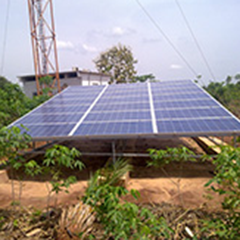Now that Togocel has implemented the Delta hybrid power system for their cell sites throughout Togo, they have already reduced OPEX costs by 60%.
Initial situation
Togocel, the largest mobile phone provider in Togo, Africa, needed to expand their cellular tower network beyond the cities and deploy BTS (Base Transceiver Station) equipment in rural areas with no grid availability or where the grid is often unreliable. The BTS is the equipment that facilitates wireless communication between user equipment and a network. The conventional way for the telecom operator to deploy the BTS-equipment and provide the required off-grid power supply is to utilize diesel generator sets. The use of diesel-fueled generator sets for powering base transceiver stations is very costly and has several inherent challenges.
One of the largest challenges with diesel gensets pertains to the diesel fuel required to run the generators. Not only is the fuel expensive, but it has to be stored on site where fuel theft or potential flammability become risk factors. The maintenance of the generator is also very costly and requires frequent trips to the site for filter or oil changes, which increases personnel and transportation costs. When the diesel motors in the generator run non-stop, 24 hours a day, 365 days a year, the mechanical parts can wear out after only 2 years and the generator motors have to be replaced at a very high cost. Togocel wanted to find a power management solution for their off-grid BTS sites to reduce the use of diesel gensets and to lower OPEX (Operational expenditure) costs.
Project realization
Togocel put the project out to tender and Delta’s sales partner won the contract with Delta’s hybrid power solution. The sales partner offered Togocel the Delta solution with financing, installation, commissioning and a maintenance contract. Delta’s renewable hybrid power solution (hybrid meaning having two or more power sources – in this case a PV array, a diesel generator set and battery backup) became a good choice for their off-grid BTS sites – capable of providing a secure source of power supply that is modular, requires low maintenance and available at affordable cost.
The solar array at the site provides enough power to run the telecom equipment and also recharge batteries during the daytime. At night when the solar power is no longer available, the batteries will power the site until the pre-set charge level is reached. At this point, the diesel generator set will activate to provide power to the base station equipment and also recharge the batteries. But the generator set does not always have to start on every cycle, it can depend on when the batteries are depleted, the amount of telephony traffic, and temperature of the batteries that vary according to the time of year.
The Delta hybrid power solution was specifically designed for remote and off-grid BTS-equipment, with remote supervision capabilities tailored to the customer’s requirements.
Conclusion
Now that Togocel has implemented the Delta hybrid power system for their cell sites throughout Togo, they have already reduced OPEX costs by 60%. Also, with a low CAPEX (capital expenditure) due to Delta’s cost-saving solution, combined with the fast ROI (return on investment), the company is able to lower the cost of ownership to a minimum.
By using a PV power source and high-efficiency Delta power conversion equipment, Togocel now has a stable power supply that allows them to greatly reduce the use of the diesel generator sets and reduce fuel consumption by 50%. Remote supervision capability provided by the system has also contributed to less onsite personnel and transportation costs. Maintenance cost, noise and pollution from the diesel generator sets is greatly reduced and the carbon footprint of the sites is also smaller.
The customer was very satisfied with the resulting solution and its many benefits, and has placed an order for additional Delta hybrid power systems for 16 new sites.













